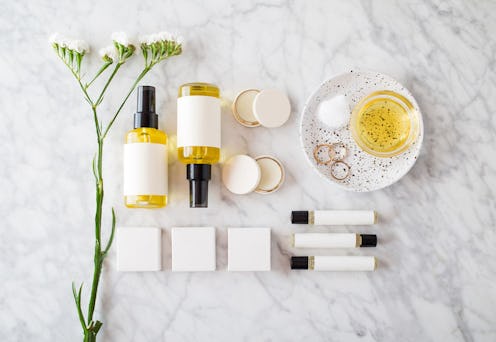Style
Greenwashing Is The New Beauty Trend That Could Be Pulling The Wool Over Your Eyes

The last five years have seen an incredible influx of terms relating to forward-thinking beauty evolution. From clean beauty to vegan products, environmentally friendly packaging to organic formulations, there are a bunch of new categories our products are claiming they fit into. But who is policing this self-categorisation? Well, that's where greenwashing comes in. "What is greenwashing?" I hear you cry. Keep reading to discover everything you need to know.
Cambridge Dictionary explains that "to greenwash" is "to make people believe that your company is doing more to protect the environment than it really is." In other words, companies and brands, including those in beauty, may attempt to market their products as being "clean" or good for the environment in some way, even if that is technically not the case.
So why does this even matter? Well, more and more of us are demanding our products are better for our health and our planet. The Soil Association's Organic Beauty & Wellbeing Market report shows that Millennials and Gen Z, who represent 39 percent of the general population, are increasingly invested in the ingredients in our beauty products. Unfortunately, because of this, brands can be eager to make their products seem more environmentally friendly and healthy for the body, when they may actually not be.
What's more, it sounds as though it is surprisingly easy to pull the wool over consumers' eyes, as there are few regulations when it comes to declaring that products fit into certain categories — especially in organic beauty. In fact, in a statement sent to me from representatives of The Social Association, it was revealed that there is no legal standard in place to protect the term "organic." This means brands can claim their products are organic with little proof and little danger of finding themselves in trouble.
However, for any brand doing this, they would only be doing themselves a huge disservice. The Soil Association's research found that 72 percent of consumers said they would lose trust in a brand if they found out that a product that said organic on the label was not certified and could not meet organic standards.
With this in mind, organisations such as The Soil Association are working hard to encourage brands to become certified organic by themselves, if they are truly organic. Not only does this make clear their credentials, it also brings trust back into the beauty industry as a whole.
So, what should you be looking out for? The Soil Association's organic certification comes in the form of the 'COSMOS' logo being present on a product. This guarantees that not only are organic ingredients used inside the product, but those ingredients are sourced and manufactured free from controversial chemicals, parabens, synthetic dyes, and artificial fragrances, and the are never tested on animals.
There are two certification levels from The Soil Association (COSMOS Organic and COSMOS Natural), which you can read about fully in their report.
Luckily, big brands such as Garnier have taken the step to become certified organic by The Soil Association with their new brand Garnier Organics. Discussing how important this step was for the brand, Charlotte Blanchard, Garnier General Manager for UK & Ireland, said in a statement:
"The accreditation of Soil Association Certification was crucial for the launch of Garnier Organics. Having a 3rd party's stamp of approval, especially one with the standing of Soil Association Certification, provides Garnier with an extra level of credibility, giving the consumer confidence that the range has undergone a rigorous process to prove it is truly organic."
So, in short, if organic ingredients and environmental friendliness is important to you, always check the labels.